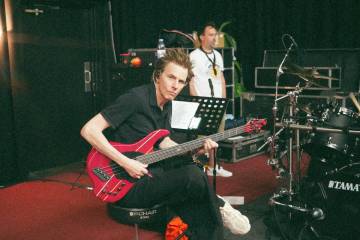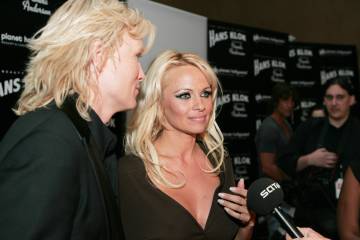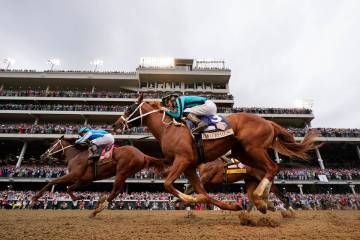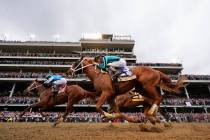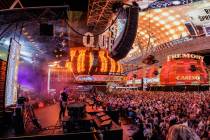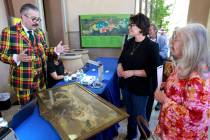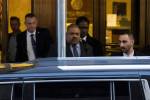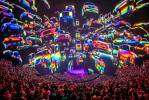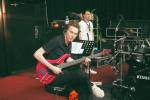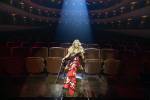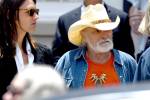Leonard Cohen
There ain't no cure for love, he once noted, though his words do come close to serving as some sort of panacea.
In his songs, Leonard Cohen's heart is a gypsy, forever wandering this lonely plain or that.
He's a romantic fatalist, and few artists have ever made love sound so wondrous and devastating from one breath to the next.
Make no mistake, though, Cohen is a true believer.
"Love's the only engine of survival," he sings on "The Future," a song that doesn't see much hope in its title.
"Things are going to slide, slide in all directions," Cohen intones in a deep, world-weary voice that sounds as if he hasn't had a good night's sleep since sometime around 1963. "Won't be nothing, nothing you can measure anymore. The blizzard, the blizzard of the world has crossed the threshold and it has overturned the order of the soul."
Yes, Cohen's catalog has its share of dark corners.
The man has crafted some of the most exquisitely beautiful and emotionally raw breakup songs ever, tunes that haunt you like the sight of a lost lover in someone else's arms.
Listen to "Chelsea Hotel No. 2," which is about Cohen's brief affair with Janis Joplin, and it's like getting railroad spikes pounded into your heart.
The tune is barely two minutes long, slight and spare, with Cohen's voice flickering over tendrils of muted guitar.
"I don't mean to suggest that I loved you the best, I can't keep track of each fallen robin," he sings at the song's conclusion, after recounting a few moments of intense passion. "I remember you well in the Chelsea Hotel. That's all, I don't even think of you that often."
And then it's over before you can even catch your breath.
Cohen's repertoire is filled with abrupt endings, from the painful infidelity of "Famous Blue Raincoat" to the wistful remembrances of "Hey, That's No Way To Say Goodbye" to the regret-filled "In My Secret Life."
Still, it would be a mistake to label him as overly dour, the cliched, wet-eyed troubadour, for even in Cohen's bleakest moments -- and there are plenty of them to go around -- there's always a dogged refusal to give up on that which stirs his passions the most.
He celebrates what torments him, and his career largely has been defined by an admirable resolve.
Now 75, Cohen came onto the scene in the late '60s as a poet and novelist turned songwriter who always infused his tunes with a pronounced literary flair. As such, his cutting, often ornate works long have been an acquired taste.
Only one of Cohen's albums has ever gone gold, and though his songs have been oft covered, he's never able to establish much more than a cult audience -- though these days, Cohen's return to the road after a prolonged absence has enabled him to pack arenas and draw his biggest crowds ever, a much deserved coda to a remarkable career.
That career has gone through several distinct stages.
Cohen's early material was mostly unadorned folk missives. By the '80s, he began larding his tunes up with too much gaudy synth, chintzy sounding electronic drums and background singers, mirroring the excesses of that era.
These days, he's a bit more in tune with his roots, having released a pair of albums this decade, 2001's "Ten New Songs" and 2004's "Songs For Heather," that sees Cohen return to slightly more austere settings, though he still collaborates heavily with singer Sharon Robinson, who offers a lively counterpoint to Cohen's bloodless rumble.
When he debuted, Cohen sang in a thin, reedy voice that since has deepened into a husky whisper, a forceful caress.
To hear it live is a rare treat.
Cohen allegedly has been forced to tour again after his former manager and lover plundered his retirement account of millions, leading him to play his first U.S. show in 15 years back in January.
It's more than a little bittersweet, then, to delight in getting a chance to see this great statesman of song onstage considering the circumstances that have brought him here.
But as with much of his career, Cohen always has been able to turn his loss into others' gain.
And so if this tour is his last bow, and it very well could be, it'll mark the final transformation of the confessions of a self-professed ugly duckling into one beautiful swan song.
"Now I bid you farewell, I don't know when I'll be back," Cohen sings on the resonant "Tower of Song." "They're moving us tomorrow to that tower down the track. But you'll be hearing from me, baby, long after I'm gone. I'll be speaking to you sweetly, from a window in the tower of song."
Contact reporter Jason Bracelin at jbracelin@ reviewjournal.com or 702-383-0476.
Preview
Leonard Cohen
8 p.m. Thursday
Colosseum at Caesars Palace, 3570 Las Vegas Blvd. South
$29.50-$275 (731-7333)




